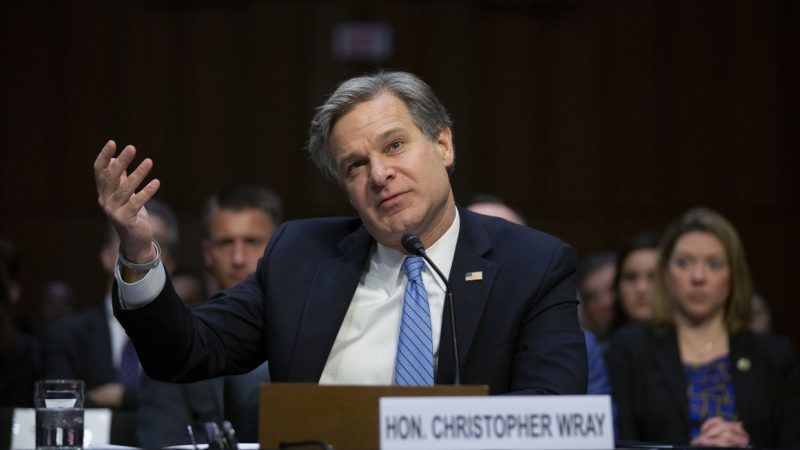The FBI Wants To Treat Carter Page Warrant Mistakes Like Training Problems. A Court Adviser Says That's Not Enough.
After seriously messing up its warrant applications with the FISA Court, can the FBI be trusted?

The FBI's newly released plans to avoid mistakes when seeking permission to wiretap and surveil American citizens is insufficient, according to an expert brought in to advise the Foreign Intelligence Surveillance Court (FISC).
In December, the Office of the Inspector General (OIG) for the Department of Justice released a report showing significant problems with the warrants that the FBI submitted to FISC in order to secretly wiretap Carter Page, a former foreign policy adviser to Donald Trump's 2016 presidential campaign. While the OIG's report concluded that the agency was justified in investigating whether Page was unduly influenced by his connections with the Russian government, it also determined that the FBI withheld important details from the FISC that might have influenced its decision to grant these warrants. These omissions were not in Page's favor, and ultimately the OIG found 17 different errors or omissions in the warrant requests, some of which were not corrected in subsequent applications.
The FISC's judges were extremely unhappy to discover information had been withheld from them, and then-presiding Judge Rosemary M. Collyer (who has since retired) ordered FBI Director Christopher Wray to send a plan to the court by January 10 explaining how the FBI would avoid making similar mistakes in the future.
Wray submitted his plan last week. It's a dense and technical response that is mostly inscrutable to anybody who does not have a history of involvement with the court's surveillance processes. Wray provides a list of 12 actions the FBI has taken or will take to make sure future applications for Foreign Intelligence Surveillance Act (FISA) warrants include all the information judges should've had when the FBI sought permission to surveil Page. Wray's plans revolve primarily around adding most steps to verify and re-verify information contained in the warrant requests to make sure that FBI agents and supervisors are not omitting information that might undermine or compromise their case for a surveillance warrant. Wray also says the agency will improve training by creating a case study program to teach FBI agents about historical precedents (I'm guessing the Page warrants will play a starring role).
While the FBI was hammering out this plan, the FISC appointed David Kris, a former Justice Department attorney during President Barack Obama's administration, to advise the court. His appointment caused some partisan-tinged outrage. Kris had previously defended the FBI's surveillance of Page and had been critical of claims by Rep. Devin Nunes (R–Calif.) that the warrants against Page had problems. Trump even attacked Kris in a tweet.
But Kris has also been skeptical of how the federal government uses surveillance against American citizens and has criticized the National Security Agency's position that laws passed to fight the war on terror and to investigate Al Qaeda permitted the agency to secretly snoop on American citizens. And he voiced these criticisms while working on national security issues at the Justice Department under President George W. Bush.
It appears that version of Kris analyzed the FBI's plans. On Wednesday, he responded that Wray's proposals were ultimately insufficient. Part of the larger problem, which Wray has acknowledged, is that it's hard to check the accuracy of information that's not included or deliberately omitted. In the Page case, much of the erroneous intel that might have dissuaded the judges from granting a warrant was not included in the warrant application, and therefore its accuracy was not assessed.
Kris does not defend the FBI's actions surveilling Page in his response, saying bluntly that nobody is disputing that "basic, fundamental, and serious errors" were found in the Page warrant requests. Kris worries that Wray's plan doesn't really account for what procedures will be used with surveillance requests that intersect with political campaigns. And while Kris does support the improvements that Wray has listed, he says the FBI needs to go further. He is calling for better communication between the FBI and Justice Department attorneys, which in this case partly contributed to the information gaps in the warrant applications. Kris also suggests the possibility of having field agents, not just agents working at FBI headquarters, signing onto warrant applications or at least requiring them to attest to the court to the facts that are in the warrant application. Field agents might be more likely to notice an important omission.
Kris also says the court should require that the FBI regularly submit reports on training participation rates and test scores. The court could, in turn, prohibit FBI agents who haven't successfully completed FISA warrant from signing on as declarants; at the very least, the court would know to bring an extra level of skepticism.
After providing a number of similar suggestions, Kris concludes: "The FBI must restore—and the Court should insist it restore—a strong organizational culture of accuracy and completeness." Students of FBI history, meanwhile, can debate whether "accuracy and completeness" have ever been part of its organizational culture.
We still don't know whether the omissions in the Page warrant were an anomaly or something that happens regularly with FISA warrants, partly because the American public has never been this privy to the process. The Justice Department OIG is launching a new audit to investigate whether the errors with the Page warrant were unique. If so, that would suggest that the FBI did indeed play fast and loose with the rules when investigating the Trump campaign, perhaps because of a bias against him.
If it turns out that what happened to Page was not unique, it would mean that the FBI has been withholding information in order to engage in an undetermined amount of secret surveillance of American citizens—which would also be bad.
Either way, there's likely more bad news to come.
This post has been updated to correct Nunes' party affiliation.



Show Comments (86)